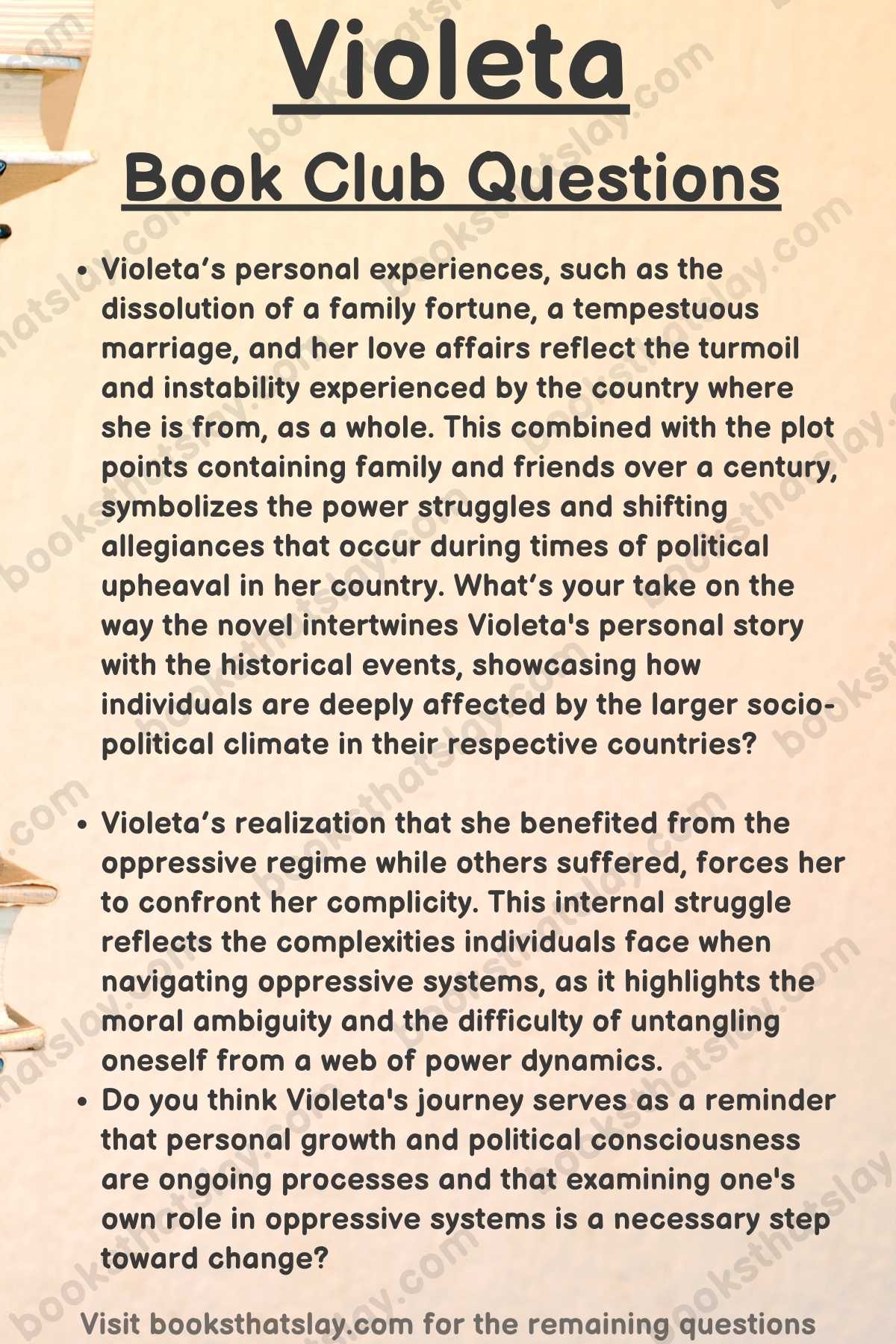10 Violeta Book Club Questions
Born in 1920, Violeta’s life unfolds against the backdrop of world-altering events: the Great War’s aftermath, the Spanish flu’s grim march, the Great Depression’s economic upheaval, and the relentless struggle for women’s rights.
Through a poignant letter to a loved one, we witness Violeta’s journey from a young girl to a resilient woman shaped by love, loss, and the relentless march of time. This discussion guide delves into the heart of Allende’s masterpiece, exploring the complexities of Violeta’s life and the historical context that shaped her indomitable spirit.
Join us as we uncover why Violeta is a must-read for those seeking a profound exploration of human resilience, the power of love, and the enduring impact of history.

Violeta Book Club Questions for Discussion
- If you have read the book completely, you must have noticed that the pandemics are mentioned at the beginning and the end of the novel. I feel that it emphasizes the cyclical nature of calamities and the persistent challenges faced by the characters mentioned.
Do you agree? Also, do you think this proves that while specific circumstances may change, calamities are an inherent part of human existence?
- Violeta’s personal experiences, such as the dissolution of a family fortune, a tempestuous marriage, and her love affairs, reflect the turmoil and instability experienced by the country where she is from as a whole. This, combined with the plot points containing family and friends over a century, symbolizes the power struggles and shifting allegiances that occur during times of political upheaval in her country.
What’s your take on the way the novel intertwines Violeta’s personal story with the historical events, showcasing how individuals are deeply affected by the larger socio-political climate in their respective countries?
- On one hand, Violeta’s reflections on marriage, motherhood, and gender double standards offer a compelling exploration of the limitations placed on women and the need for empowerment at that time. Her humor and no-nonsense ruminations provide a refreshing perspective on these issues. On the other hand, the novel’s focus on Violeta’s personal experiences and her limited lens prevents a more nuanced exploration of feminism. The absence of intersectionality and her naive, sometimes colonialist perspective hinders a comprehensive examination of gender in relation to race and class.
Discuss these sharp contradictions between Allende’s writing style when it comes to Violeta’s feminist ideologies.
- Violeta’s realization that she benefited from the oppressive regime while others suffered forces her to confront her complicity. This internal struggle reflects the complexities individuals face when navigating oppressive systems, as it highlights the moral ambiguity and the difficulty of untangling oneself from a web of power dynamics.
Do you think Violeta’s journey serves as a reminder that personal growth and political consciousness are ongoing processes and that examining one’s own role in oppressive systems is a necessary step toward change?
- Violeta’s naive and sometimes colonialist ideology reveals the blind spots and biases ingrained in her worldview. While the novel portrays her feminist awakening, it also exposes the need for further growth and understanding as the narrative challenges us to critically engage with Violeta’s perspective and consider the broader implications of her limited worldviews.
I personally felt it prompted me to reflect on my own blind spots and the importance of continually interrogating my assumptions and biases when engaging with complex social issues. What’s your take on this?
- Allende’s portrayal of sexuality and relationships, particularly through the character of Violeta, presents both challenges and reinforces traditional gender norms. While Violeta is depicted as a sexually liberated woman well into her old age, the narrative suggests that her sense of beauty and worth is only tied to male desire. Additionally, the inclusion of a queer couple in the story is seen by some as a token representation to cater to certain audiences rather than an integral part of the narrative.
Do you agree with this conclusion?
- While mixing historical evidence and personal stories can create a rich storyline, it can be argued that these elements are not well-integrated into the novel. The example of Violeta starting a foundation based on a neighbor’s abuse, which appears to exist only to comment on bureaucratic corruption, further adds fuel to the issue.
This lack of clear motivation and deep exploration of the incidents hindered the overall coherence of the story. Do you agree?
- The narrative structure of the novel, with Violeta serving as the narrator and the story being told to her grandson, was quite an interesting take by Allende. While it added a sense of personal touch and intimacy to the storytelling, I personally felt it hindered the narrative by creating a didactic mood and placed heavy emphasis on the aspect of telling and not showing/doing.
Discuss.
- The historical backdrop of the Pinochet regime and other political events in Chile helped us understand the challenges, turmoil, and impact of these events on the characters’ lives. The portrayal of these events enhanced the story by providing a realistic backdrop and creating a sense of authenticity.
Why do you think Allende chose this particular time period and this particular regime? Anything special that happened in Chile back in those days that we did not know?
- Whether or not to recommend Violeta based on its story would depend on individual preferences. If you appreciate fluent writing, family sagas, and a broad historical backdrop, you might enjoy the novel. However, those who prefer a more immediate and dramatic storytelling style or seek a cohesive and tightly woven narrative may not find the book that interesting.
Would you recommend this book to your fellow bibliophile? Why and why not?
If you liked this set of questions, here are some other options for you to explore.